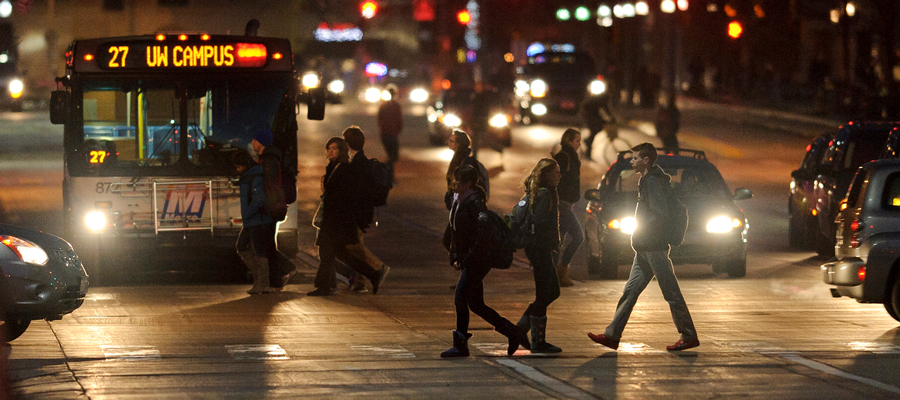A new initiative is helping bridge a technology gap for many UW employees who work late and overnight shifts.
UW–Madison recently deployed a dozen new workstations to provide computer access for custodial and maintenance staff and other employees who work 2nd and 3rd shifts. The kiosks address an equity issue identified by the university’s Second and Third Shift Issues Committee, a shared governance group charged with finding and addressing issues for UW employees who work outside the first shift.

Many of the hundreds of UW employees who clean buildings, maintain facilities, provide security and work other overnight roles do not have regular computer access and rely on mobile phones to get information, making it difficult to complete HR tasks and keep up with campus news and updates.
“Many UW employees are assigned a computer as part of their job, making it easy to complete required training, apply for health benefits, get parking, keep up with email and campus updates, and many other things that a lot of us take for granted,” said Thad Molling, associate director of Departmental Support in the Division of Information Technology (DoIT). “However, many employees who do vital work on this campus, like custodial staff, aren’t issued computers. And then, on top of that, the computers in InfoLabs and libraries aren’t available when you’re working at 2, 3 or 4 o’clock in the morning.”
Previously, late-shift workers could take advantage of public-use kiosks around campus, a program dating back to a time before many UW students and employees had personal devices. The university decommissioned those kiosks in 2019 due to their age, low usage and cybersecurity concerns. Since then, some night shift workers have borrowed devices from their supervisors to complete work tasks or have had to cross busy thoroughfares at night to reach locations with available computers. Aside from the inconvenience, these stopgap solutions raised cybersecurity, privacy and safety concerns.
The Second and Third Shift Issues Committee brought this information to university leadership, sparking a collaboration between DoIT, the Vice Chancellor for Finance and Administration, University Housing, and Facilities Planning and Management (FP&M), which employs most of UW’s 2nd and 3rd shift workers.
“This is a great example of a cross-functional campus effort,” said Sue Fritts, HR director for FP&M, who led the initiative. “It’s been super cool to be able to work with all these different people from different parts of campus, from governance to facilities to DoIT, all having the same intent. It’s been so positive seeing this collaboration come together.”
FP&M Shared Access Computer Kiosks
The work group carefully considered where to locate the kiosks, working with building managers to identify areas without computers and with shift supervisors to find spaces like break rooms and dispatch offices where 2nd and 3rd shift employees frequently congregate before and after shifts and during breaks. In many locations, DoIT and FP&M staff installed new wired and wireless network endpoints and new power outlets, in addition to supplying the computers, accessories, desks and chairs (read the shared access computer kiosks documentation).

DoIT staff also configured the machines with unique policies to protect personal information and wipe user profiles after 30 days since they are shared machines. Cultural Linguistic Services translated the computer use instructions (PDF) into multiple languages to accommodate UW’s diverse workforce. DoIT is working with UW’s ADA Coordinator to ensure the kiosks are accessible.
So far, the response from employees and the Second and Third Shift Issues Committee has been positive, according to Fritts.
“People appreciate that we came together to address this void,” Fritts said. “People feel like they were heard through this process and are glad we were able to take care of this concern.”
While the project collaborators originally intended the kiosks to help late-night staff, they are now examining options for expanding access to other employees without easy computer availability. They’re also exploring options for training interested staff in basic computer operations to help ensure no new computer equity gaps arise as the university prepares to move many tasks to Workday as part of the Administrative Transformation Program.
